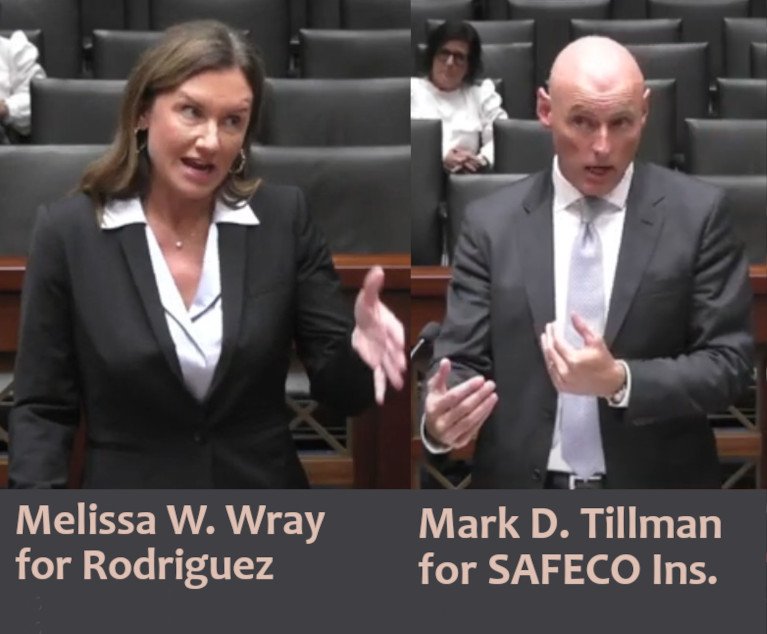In the case of Rodriguez v. Safeco Ins. Co. of Indiana, the Texas Supreme Court recently heard oral arguments on a certified question that has far-reaching implications for property-damage insurance claims in Texas. The central issue revolves around whether attorneys can get paid on such claims and the interpretation of the 2017 Texas Prompt Payment and Claims Act.
The homeowner’s argument, represented by Melissa W. Wray of Daly & Black, is rooted in the intent of the law—to promote prompt payment of insurance claims by imposing liability for attorney fees on insurers who do not adhere to the act’s deadlines. They assert that attorney fees should remain recoverable even when insurers invoke the policy appraisal provision and pay damages and interest. This interpretation, if adopted, would have a significant impact on the rights of policyholders and the dynamics of insurance claim disputes.
During the oral arguments, the Texas Supreme Court justices appeared perplexed and uncertain about when attorney fees should apply within the context of an insurance claim. They struggled to find clarity within the text of the statute and debated the timing of when attorney fees might become applicable. The justices’ questions and discussions indicated that the issue is not straightforward and has broader implications for the insurance industry and consumers in Texas.
The potential consequences of the court’s decision are significant. If the court interprets the law in a way that limits the recovery of attorney fees for policyholders, it could create challenges for homeowners and other insured parties in Texas when dealing with insurance claim disputes. It may also impact the balance of power between insurers and policyholders, potentially influencing how insurance companies handle claims and disputes.
Furthermore, the uncertainty surrounding the interpretation of the law could lead to increased litigation and legal costs for both insurers and policyholders. The outcome of this case could ultimately affect the affordability and accessibility of property insurance coverage in Texas, as well as the overall climate for resolving insurance claims in a timely and fair manner.
In summary, the Rodriguez v. Safeco case has far-reaching implications that extend beyond the immediate parties involved. It raises fundamental questions about the interpretation of Texas insurance law and its impact on the rights and interests of policyholders and the insurance industry as a whole. The decision reached by the Texas Supreme Court in this case is eagerly anticipated and is expected to provide crucial guidance on the future handling of property-damage insurance claims in the state.
What You Can Do
The outcome of the Rodriguez v. Safeco Ins. Co. of Indiana case has the potential to shape the landscape of property-damage insurance claims in Texas. As a concerned homeowner or policyholder, there are several actions you can take to stay informed and engaged:
1. Stay Informed:
Stay updated on developments related to the case by following reputable news sources and legal updates. Understanding the court’s decision and its implications is essential.
2. Advocate for Your Rights:
If you’re currently dealing with an insurance claim dispute, be aware of your rights as a policyholder. Consult with legal professionals who specialize in insurance claims to ensure your interests are protected.
3. Connect with Advocacy Groups:
Consider connecting with homeowner advocacy groups or organizations dedicated to insurance reform in Texas. These groups often provide valuable resources, support, and information for policyholders.
4. Engage in Policy Discussions:
Participate in discussions and forums related to insurance reform and property-damage claims. Sharing your experiences and insights can contribute to the broader conversation about homeowner rights.
5. Contact Your Representatives:
Reach out to your local and state representatives to express your concerns about insurance claim practices and advocate for fair legislation. Your voice can make a difference in shaping policy decisions.
6. Legal Consultation:
If you believe your insurance claim has been unfairly handled or denied, consult with an attorney who specializes in insurance law. They can provide guidance on your specific situation and help you navigate the legal process.
7. Support Reform:
Support initiatives and reforms aimed at improving the insurance claims process in Texas. Your support can contribute to creating a more equitable system for all policyholders.
By staying informed and actively engaging in discussions about insurance reform, you can play a role in shaping the future of property-damage insurance claims in Texas and ensure that homeowner rights are protected and upheld.
FAQ
The key issue is whether attorneys can be paid for representing policyholders in property-damage insurance claims under the 2017 Texas Prompt Payment and Claims Act, especially when insurers pay claims after invoking the appraisal provision.
A decision limiting the recovery of attorney fees could challenge policyholders in Texas by making it harder to dispute insurance claims, potentially affecting the balance between insurers and policyholders.
The outcome could influence how insurance claims are handled, potentially leading to more litigation, higher legal costs, and affecting the affordability and accessibility of property insurance in Texas.
Stay informed on the case developments, understand your rights, consult with legal professionals, engage with advocacy groups, participate in policy discussions, and contact your representatives to advocate for fair insurance practices.
The justices struggled with the statute’s text and the timing of when attorney fees should be applicable, indicating the complexity and broader implications for the insurance industry and consumers.
Yes, the uncertainty surrounding the law’s interpretation may result in more disputes between insurers and policyholders, leading to increased litigation and associated costs.
By consulting with attorneys specializing in insurance law, staying informed about their rights, and potentially seeking support from homeowner advocacy groups or organizations dedicated to insurance reform.




